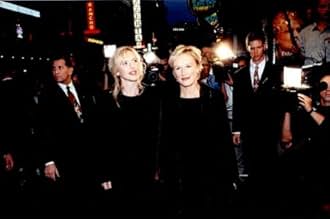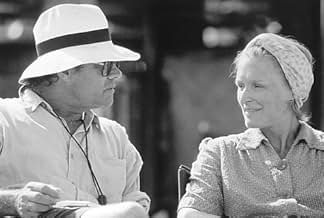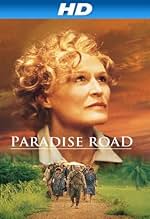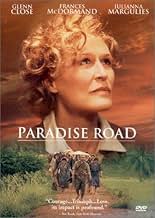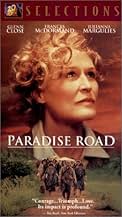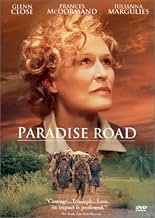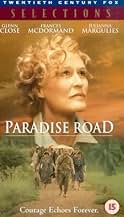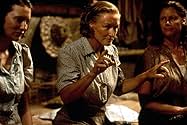IMDb-BEWERTUNG
6,8/10
6176
IHRE BEWERTUNG
Singapur, 1942: Ein japanischer Bombenangriff beendet das Luxusleben der englischen Oberschicht.Singapur, 1942: Ein japanischer Bombenangriff beendet das Luxusleben der englischen Oberschicht.Singapur, 1942: Ein japanischer Bombenangriff beendet das Luxusleben der englischen Oberschicht.
- Auszeichnungen
- 1 Gewinn & 7 Nominierungen insgesamt
Johanna ter Steege
- Sister Wilhelminia
- (as Johanna Ter Steege)
Empfohlene Bewertungen
The film was both moving and heart warming. It shows the unbelievable story of a group of women surviving a PoW camp against all the odds. I found it hard to believe that anyone was made to live in the conditions they were put in and live to tell the story. The acting was excellent and i don't think this film has got the praise it deserves. It is made even more moving by the fact it is based on a true story.
I love this movie because I love the characterization of the women in it. I felt powerfully with the women, felt I knew them, felt complete identification with most of them.
I actually think it's hard to specify the actions and words that will make a character both realistic and sympathetic. Showing mere suffering won't do it. But here, Mr. Beresford has been able to stir such warm feelings (particularly toward the Roberts girl, the Glenn Close and Jennifer Ehle, her Dutch friend, and the Cate Blanchett characters). The romanticism, cheer and background of the Ehle character are particularly well drawn.
This is a far superior movie to 'Platoon', by the way - and a wonderful tribute to those who went through the awful 3.5 year ordeal.
Another thing I quite liked (these days) was to see a movie that did not attempt to make the Caucasians the moral villain relative to the other race depicted.
This is not a movie concerned with p.c. appearances - the Japanese are not shown as somehow merely "different", a difference we "simply cannot understand or judge" because of our different culture. Setting a woman on fire for bargaining for medicine for a sick elderly woman is brutality in any culture - and this movie does not attempt to minimize the moral wrong.
Bravo, Mr. Beresford.
I actually think it's hard to specify the actions and words that will make a character both realistic and sympathetic. Showing mere suffering won't do it. But here, Mr. Beresford has been able to stir such warm feelings (particularly toward the Roberts girl, the Glenn Close and Jennifer Ehle, her Dutch friend, and the Cate Blanchett characters). The romanticism, cheer and background of the Ehle character are particularly well drawn.
This is a far superior movie to 'Platoon', by the way - and a wonderful tribute to those who went through the awful 3.5 year ordeal.
Another thing I quite liked (these days) was to see a movie that did not attempt to make the Caucasians the moral villain relative to the other race depicted.
This is not a movie concerned with p.c. appearances - the Japanese are not shown as somehow merely "different", a difference we "simply cannot understand or judge" because of our different culture. Setting a woman on fire for bargaining for medicine for a sick elderly woman is brutality in any culture - and this movie does not attempt to minimize the moral wrong.
Bravo, Mr. Beresford.
Why didn't more people see this film? This is what makes it great:
As an ensemble piece it works wonderfully - the cast are truly magnificent. Glenn Close is fabulous as the 'central' character and most well known 'star', but she does not monopolise all the scenes and screen time. She blends in with what is a wonderful cast, and does so impeccably. Why she hasn't been given more kudos as an actress is beyond me - she is stunning.
The film worked perfectly because of what comes across as a genuine rapport between the female cast. Each actress brings a different element to the story - Jennifer Ehle is strong willed and beautiful, Julianna Marguilles fiesty and dominant, Pauline Collins has such a human quality which she conveys to perfection, Cate Blanchett portrays wonderfully a quiet woman with a rebellious side. All compliment and balance each other. The actresses succeed admirably in bringing to the fore the bond that grew between their real life inspirations for this story.
The direction is precise and the cinematogrpahy beautiful. Despite the bleak context, Japan still looks vibrant and colourful, full of life.
The score. I can't do justice to the score in words - the vocal orchestra formed by the women is just beautiful and poignant to listen to and really does need to be heard to be understood. Somehow the actresses manage to make the music symbolise their humanity and spirit. It works wonderfully.
Overall, this is a heartfelt film with a profound message of hope which runs all the way through it. 'Paradise Road' is one of those rare films which reminds you of the indestructible nature of the human spirit. I wish there were more films like this one, and I wish more people had have seen this film. In a word it's a gem.
As an ensemble piece it works wonderfully - the cast are truly magnificent. Glenn Close is fabulous as the 'central' character and most well known 'star', but she does not monopolise all the scenes and screen time. She blends in with what is a wonderful cast, and does so impeccably. Why she hasn't been given more kudos as an actress is beyond me - she is stunning.
The film worked perfectly because of what comes across as a genuine rapport between the female cast. Each actress brings a different element to the story - Jennifer Ehle is strong willed and beautiful, Julianna Marguilles fiesty and dominant, Pauline Collins has such a human quality which she conveys to perfection, Cate Blanchett portrays wonderfully a quiet woman with a rebellious side. All compliment and balance each other. The actresses succeed admirably in bringing to the fore the bond that grew between their real life inspirations for this story.
The direction is precise and the cinematogrpahy beautiful. Despite the bleak context, Japan still looks vibrant and colourful, full of life.
The score. I can't do justice to the score in words - the vocal orchestra formed by the women is just beautiful and poignant to listen to and really does need to be heard to be understood. Somehow the actresses manage to make the music symbolise their humanity and spirit. It works wonderfully.
Overall, this is a heartfelt film with a profound message of hope which runs all the way through it. 'Paradise Road' is one of those rare films which reminds you of the indestructible nature of the human spirit. I wish there were more films like this one, and I wish more people had have seen this film. In a word it's a gem.
Paradise Road is based on the true story of women POWs in Sumatra during WWII. The film, for the most part, follows what really happened... with one glaring exception!
The incident that is prominently missing from Paradise Road is the Bangka Island massacre, which was one of the worst atrocities committed against women POWs during WWII and is an integral part of this story.
After their ship, The SS Vyner Brooke, was sunk, the survivors made for the nearest land which was Bangka Island. They came to shore in different places but a group of more than a hundred people ended up on Radji beach. The group consisted of 22 Australian Army nurses, some civilian men, women and children, and 30 British soldiers from another ship which had been sunk. The island was fully occupied by the Japanese and the group unanimously decided to give themselves up. The group leader set off to find someone to surrender to. The civilian women and children began walking towards the main town on the island. The 22 nurses remained behind with the men and the soldiers (many of whom were badly wounded), an elderly British woman also remained with her wounded husband.
When the group leader returned with a group of 20 Japanese, they ignored all requests for surrender. The Japanese shot and bayoneted the men, then ordered the 23 women to walk into the ocean. When they reached waist depth, the Japanese open fired with a machine gun and mowed the women down.
There was one survivor. One of the nurses, Vivian Bullwinkel, was shot through the side and survived by pretending to be dead. She hid in the jungle for 12 days, caring for a British soldier who had been bayoneted and left for dead (he later died). Eventually, she gave herself up and was re-united with the rest of the women in the prison camp in Muntok. When she told them what had happened on the beach and they quickly realised that they would all be killed if the Japanese learned there was a witness to the massacre. So they made a pact not to speak of it again until they were free.
Paradise Road is a fictional film based loosely on fact, not a documentary. Sometimes it is necessary to make changes to the real sequence of events in order for the film's structure and pacing to work. I do accept this and I would prefer to see a good film rather than a accurate one.
But in leaving out the massacre on the beach, the film does a disservice to these women. These women were aware, from the start of their internment, that the Japanese were capable of atrocities on a massive scale and that there was no safety in numbers. They lived in a constant state of fear that the Japanese would repeat such an act or learn that Vivian Bullwinkel had survived the massacre and kill them all.
Paradise Road tries to portray Japanese atrocities with a fictitious incident where a woman is set on fire (which did not really happen) but this does not compare to the scale of the 80 people massacred on Radji beach and the effect it had on the women in the camp. There were 32 Australian Army nurses in the camp and the women who died on the beach were their friends and colleagues. They were from the same unit and had nursed together for the first two years of the war. All their interactions with the Japanese guards were coloured by the knowledge that they had murdered 22 of their friends in cold blood.
Paradise Road is a very good movie and I suspect it will become the definitive film about female POWs during WWII. Which sadly means that the 22 women who were murdered on Radji beach will be lost from memory... and they deserve better than that.
If you want to learn more about the women POWs of Sumatra, I suggest you read "White Coolies: Australian Nurses Behind Enemy Lines," the diary kept by camp survivor Betty Jeffrey, or read the biography "Bullwinkel" by Norman G. Manners. There is also an excellent 1985 documentary called "Song of Survival", and a really tacky episode of "Willesee's Australians" that dramatises the story of Vivian Bullwinkel.
The incident that is prominently missing from Paradise Road is the Bangka Island massacre, which was one of the worst atrocities committed against women POWs during WWII and is an integral part of this story.
After their ship, The SS Vyner Brooke, was sunk, the survivors made for the nearest land which was Bangka Island. They came to shore in different places but a group of more than a hundred people ended up on Radji beach. The group consisted of 22 Australian Army nurses, some civilian men, women and children, and 30 British soldiers from another ship which had been sunk. The island was fully occupied by the Japanese and the group unanimously decided to give themselves up. The group leader set off to find someone to surrender to. The civilian women and children began walking towards the main town on the island. The 22 nurses remained behind with the men and the soldiers (many of whom were badly wounded), an elderly British woman also remained with her wounded husband.
When the group leader returned with a group of 20 Japanese, they ignored all requests for surrender. The Japanese shot and bayoneted the men, then ordered the 23 women to walk into the ocean. When they reached waist depth, the Japanese open fired with a machine gun and mowed the women down.
There was one survivor. One of the nurses, Vivian Bullwinkel, was shot through the side and survived by pretending to be dead. She hid in the jungle for 12 days, caring for a British soldier who had been bayoneted and left for dead (he later died). Eventually, she gave herself up and was re-united with the rest of the women in the prison camp in Muntok. When she told them what had happened on the beach and they quickly realised that they would all be killed if the Japanese learned there was a witness to the massacre. So they made a pact not to speak of it again until they were free.
Paradise Road is a fictional film based loosely on fact, not a documentary. Sometimes it is necessary to make changes to the real sequence of events in order for the film's structure and pacing to work. I do accept this and I would prefer to see a good film rather than a accurate one.
But in leaving out the massacre on the beach, the film does a disservice to these women. These women were aware, from the start of their internment, that the Japanese were capable of atrocities on a massive scale and that there was no safety in numbers. They lived in a constant state of fear that the Japanese would repeat such an act or learn that Vivian Bullwinkel had survived the massacre and kill them all.
Paradise Road tries to portray Japanese atrocities with a fictitious incident where a woman is set on fire (which did not really happen) but this does not compare to the scale of the 80 people massacred on Radji beach and the effect it had on the women in the camp. There were 32 Australian Army nurses in the camp and the women who died on the beach were their friends and colleagues. They were from the same unit and had nursed together for the first two years of the war. All their interactions with the Japanese guards were coloured by the knowledge that they had murdered 22 of their friends in cold blood.
Paradise Road is a very good movie and I suspect it will become the definitive film about female POWs during WWII. Which sadly means that the 22 women who were murdered on Radji beach will be lost from memory... and they deserve better than that.
If you want to learn more about the women POWs of Sumatra, I suggest you read "White Coolies: Australian Nurses Behind Enemy Lines," the diary kept by camp survivor Betty Jeffrey, or read the biography "Bullwinkel" by Norman G. Manners. There is also an excellent 1985 documentary called "Song of Survival", and a really tacky episode of "Willesee's Australians" that dramatises the story of Vivian Bullwinkel.
First class work here. The film follows a group of women captured in Asia by the Japanese, and interned as enemy aliens. It shows the inhuman brutality that the Japanese inflicted on anyone they considered to be of an inferior race. (i.e. not Japanese) (for that matter anyone not samurai) As a coping mechanism, and partially in defiance of their captors, the women form a vocal orchestra, playing the parts of classical music with only their voices. The music soothes the women, those in the orchestra, and those who aren't. The Japanese soldiers even come to enjoy the sound, and the atrocity rate drops a couple of notches.
Stand out performances abound here. In fact I can't really single out any of the cast. They were all good, including the Japanese actors. I had thought from the reviews that the music would be the largest part of the film, with just the backdrop of the prison camp, but it really wasn't. I recommend this film.
Stand out performances abound here. In fact I can't really single out any of the cast. They were all good, including the Japanese actors. I had thought from the reviews that the music would be the largest part of the film, with just the backdrop of the prison camp, but it really wasn't. I recommend this film.
Wusstest du schon
- WissenswertesThe music in the film was derived from the actual score transcripts used in the P.O.W camps which survived World War II.
- PatzerThe women of the choir did the singing while sitting down because of having to work in the extreme heat during the day left them exhausted.
- Zitate
Adrienne Pargiter: You don't hate them do you?
Margaret Drummond: No.
Adrienne Pargiter: Why not?
Margaret Drummond: I've tried, but I can't bring myself to hate people. The worse they behave, the sorrier I feel for them.
- SoundtracksSymphony No. 9 in E minor Op. 95 'From the New World' II. Largo
Written by Antonín Dvorák (as Antonin Dvorak)
Top-Auswahl
Melde dich zum Bewerten an und greife auf die Watchlist für personalisierte Empfehlungen zu.
- How long is Paradise Road?Powered by Alexa
Details
- Erscheinungsdatum
- Herkunftsländer
- Sprachen
- Auch bekannt als
- Paradise Road
- Drehorte
- Produktionsfirmen
- Weitere beteiligte Unternehmen bei IMDbPro anzeigen
Box Office
- Budget
- 16.000.000 $ (geschätzt)
- Bruttoertrag in den USA und Kanada
- 2.007.100 $
- Eröffnungswochenende in den USA und in Kanada
- 62.518 $
- 13. Apr. 1997
- Weltweiter Bruttoertrag
- 2.007.100 $
- Laufzeit2 Stunden 2 Minuten
- Farbe
- Sound-Mix
- Seitenverhältnis
- 2.35 : 1
Zu dieser Seite beitragen
Bearbeitung vorschlagen oder fehlenden Inhalt hinzufügen



